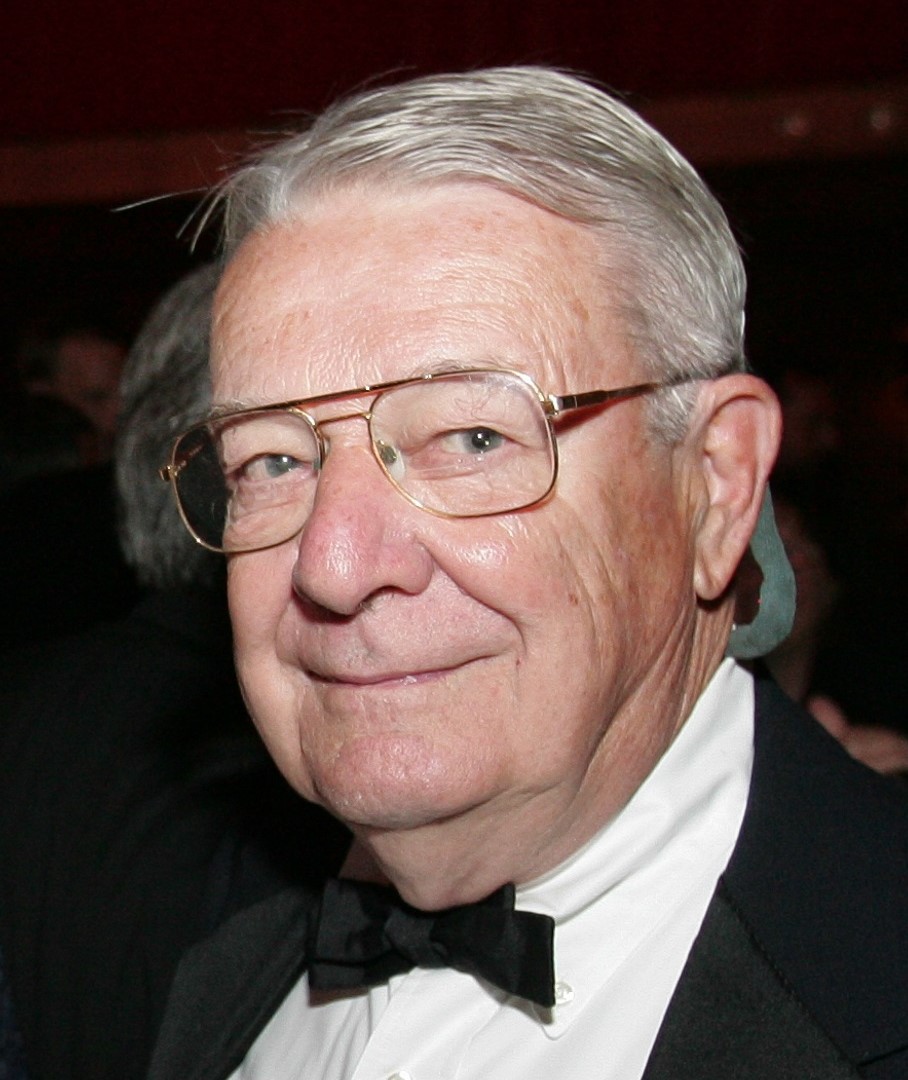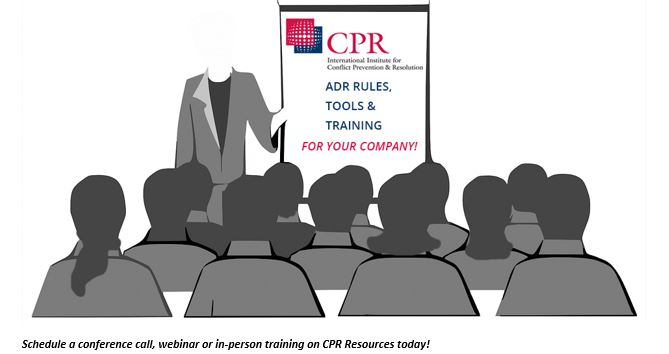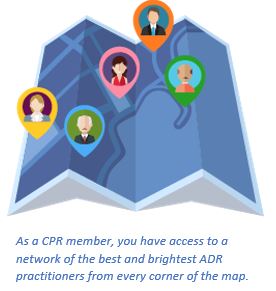CPR’s new website now hosts the CPR Speaks blog. You can find new posts, at https://www.cpradr.org/news/cpr-speaks.
The Membership Minute
The ADR Legacy of CPR’s Founding Father, James F. Henry–In Memoriam

Jim Henry
CPR’s founder, James F. Henry, has passed away.
He leaves behind a legacy trailblazing the use of methods other than litigation to resolve business disputes. His impact is immeasurable. He is responsible for promoting processes, techniques, and tools for alternative dispute resolution for major business conflicts, and expanding its use by lawyers throughout the world.
He founded and then served as president and chief executive officer of CPR, overseeing its initial initiatives with a group of in-house counsel to later include law firm practitioners, academics, and international firms and partner organizations, from CPR’s inception until his 2000 retirement.
Even after his retirement, he continued to advocate for better dispute resolution, writing–including in Alternatives to the High Cost of Litigation, which he founded in 1983 (and for which he served as publisher during his CPR years)–and occasionally speaking.
CPR established the James F. Henry Award in 2002. It honors outstanding achievement by individuals for distinguished, sustained contributions to the field of ADR, based on their leadership, innovation and sustaining commitment to the field.
“We’re all privileged and humbled to be walking in Jim Henry’s footsteps,” said Allen Waxman, CPR’s president and chief executive officer since 2019. “He foresaw in a way many others did not the need for business to find better ways to resolve their conflicts than what court systems might offer. He was a maven for innovation, pushing for greater creativity, efficiency, and fairness in ADR processes. We are all beneficiaries of his work and leadership.”
Henry died on Aug. 28. He had lived in Waccabuc, N.Y., where he resided for seven decades. He was 91.
Henry’s family has announced a celebration of his life on Sunday, Nov. 13, at 3:00 p.m., in Waccabuc. They have asked that if you are able to attend, please let the family know so that they can send you an invitation. The contact is Stephen Henry at shenry@henrylacey.com.
Henry founded CPR in 1977 to continue previous foundation work on social justice issues that included studying poverty, Native American issues, and tropical disease eradication. In due course, it became the Center for Public Resources (later to change to the International Institute for Conflict Prevention and Resolution); its subject focus was business ADR. His delivery devices included new sets of conflict resolution rules, tools, initiatives and programs. (A timeline of Henry’s and CPR’s history is available on CPR’s website here.)
Initially, he and the organization championed mediation and negotiation. He strove to have lawyers talk first before marching to courts. That resulted in the mid-1980s in CPR’s signature “Pledge,” the Corporate Policy Statement on Alternatives to Litigation. (See background and text https://bit.ly/3CDmyjH.) Under the nonbinding pledge, a company agrees that it will consider—and be ready to negotiate–a resolution with the dispute resolvers at its adversaries.
The pledge idea spread from CPR to companies throughout the legal world. It became CPR’s signature effort in the 1980s. Thousands of big companies and subsidiaries signed on.
That led to a similar pledge for law firms—that they would discuss with the clients in appropriate case the use of ADR. Industry commitments followed, in which groups of businesses agreed to resolve, by negotiation or mediation, specific disputes that arise among the competitors within those industries. (The pledges and commitments can be seen here.) Similarly, Henry spearheaded efforts at CPR to bring together academics and attorneys at all levels to translate theory into effective practice.
The resonance of Henry’s CPR pledge continued well after his retirement, and continues today. In 2012, a “21st Century Pledge” modernized the idea to institutionalize the pursuit of corporate ADR systems.
CPR has continued this tradition of pledges seeking innovation in dispute management by recently establishing a pledge that businesses will consider incorporating mechanisms into their arrangements with others, not just to resolve disputes, but prevent them altogether. See CPR’s Dispute Prevention Pledge for Business Relationships (revised April 5, 2022) at www.cpradr.org/resource-center/adr-pledges/dispute-prevention-pledge-for-business-relationships.
The pledge didn’t stand alone at CPR, even in the mid-1980s. With the assistance of the late Harvard Law School Prof. Frank E.A. Sander, Henry established the CPR Awards (go here for details on this year’s awards-entry deadline next month and submission instructions), to recognize but also to incentive business and academic development of the processes and systems that CPR began to produce, including nonadministered arbitration rules and guidelines for establishing and using minitrials.
Those resources and materials, and many others including international and translated versions, are still vital, and can be found on CPR’s website at https://bit.ly/3ryxCID. (Sander became the longest serving member of Alternatives’ editorial board, from its 1983 inception until his death in 2018.)
Henry correctly projected that private ADR forums initiated by companies and industries would continue to proliferate after CPR’s 1980s work. He cited and worked to expand corporate dispute resolution programs ranging from employment settings to case management. He later worked with court administrators on programs that impacted the installation of ADR offices by Presidents George H.W. Bush and Bill Clinton in the 1990s in every federal court in the nation, as well with executive branch government ADR officials. And he expanded CPR’s initiatives to arbitration rules and ethics standards for ADR providers and practitioners.
* * *
Henry’s principle delivery system, however, actually was the lawyers themselves.
Exhibiting a lifelong devotion to improving society through law, Henry continually emphasized best practices in lawyering. He had confidence that excellent legal skills would bring the informal dispute resolution processes that had been performed for years to a valued place in legal operations and management.
Henry set out to assemble those people, and make them available to disputes. CPR Dispute Resolution has grown its Panel of Distinguished Neutrals to more than 600 neutrals today, and has addressed cases valued in the billions of dollars.
Henry saw the work of lawyers as the key to ADR success, as well as CPR, a New York-based nonprofit. He was a tireless cheerleader throughout his tenure as CPR’s president and CEO until his 2000 retirement for bringing out the best in the legal profession, and making ADR skills a requirement.
That in turn created a network of devotees to, and members in, what came to be known in the mid-1990s as the CPR Institute for Dispute Resolution, ahead of the current name that added the international perspective begun under Henry. CPR members have led in the use of commercial conflict resolution for their clients’ problems, both in house and at law firms, world-wide.
* * *
Jim Henry was born in 1930 in Grand Rapids, Mich., and attended Williams College. He later served as a U.S. Army Intelligence Officer, and was awarded law degrees from the Georgetown University Law Center in Washington, D.C., and the New York University School of Law.
CPR President Allen Waxman said, “On behalf of the board and staff at the International Institute for Conflict Prevention and Resolution, we send deepest condolences to Jim’s wife, Susan Henry, and their three children and eight grandchildren.”
* * *
The November issue of Alternatives to the High Cost of Litigation has published an expanded version of this tribute to Jim Henry’s life. See CPR News, 40 Alternatives 154 (November 2022) (available at https://bit.ly/3DgLuMV). An archive of Henry’s Alternatives feature articles can be accessed directly on the Wiley Online Library at https://bit.ly/3ylmkLs.
[END]
Membership Minute: A Treasure Trove of ADR Resources
This posting is the second in an ongoing series written by Niki Borofsky, Vice President of Membership, focusing on CPR Members and ways to make the most of CPR Member Benefits.
For 40 years, CPR has been bringing together in-house counsel, outside attorneys, academics and neutrals to think creatively and forge new tools, better rules, and improved processes – all with the goal of making dispute resolution more cost effective, more efficient, and better for business in the long run.
As an independent, not-for-profit think tank and dispute resolution services provider, we have the unique ability to convene all stakeholders and pick the brains of experts from every perspective.
CPR’s corporate members bring the practical in-the-trenches advice on how they use ADR, law firm advocates speak from decades of practice in multiple jurisdictions, our neutrals illuminate what is integral to their decision-making processes, and academics inject research and theory into the equation. The result is a collection of products that have been vetted, approved and road tested by businesses and top practitioners.


A Menu of Options for All Levels of Expertise
The fruits of CPR’s committees’ labors are available to members through our website. The first step is to register for our website (if you have not already done so). Once you are registered and logged in as a member, these time and money-saving tools are all at your disposal free of charge, so be sure to bookmark our Resource Center on your browser.

Start with the basics.
Even if you are a master of dispute resolution yourself, there are likely other teams or lawyers in your organization who may benefit from learning the ropes. CPR’s resources can help you to bridge the gap and give you an excellent platform to share how important careful dispute resolution clause drafting is to sustaining a business relationship through difficult times. Having thoughtful contractual dispute resolution mechanisms in place is key should conflict arises, and these choices are made when drafting.
- Learn the essentials by taking our ADR 101 course
- Peruse our Early Case Assessment Toolkit
- Watch the beginners-level webinar on ADR Clause Drafting
Hone in on industry-specific learning.
The classic lawyerly response to even the most straightforward question is often – “It depends.” And rightly so, different parties and diverging matters require special consideration. Thankfully, CPR has had the time, expertise and focus to explore a variety of ADR solutions that are tailored to particular industry challenges and constraints.
- For troubles that arise when you are building a multi-billion dollar project and time is of the essence, check out the CPR Rules for Expedited Arbitration of Construction Disputes
- Negotiating a valuable IP contract? Think about using CPR’s Patent Arbitration and Mediation Model Clauses
- Pulling together an IT joint venture? Explore the possibility of encouraging partners to sign CPR’s Information Technology Industry Dispute Resolution Commitment
Resort to the Rules.
For corporations and practitioners, one of the most concrete and powerful resources CPR has to offer (not just to members, but to all parties) is the 2014 Rules for Administered Arbitration of International Disputes. These rules benefit from CPR’s emblematic multi-stakeholder engagement, and as a result encompass best practices and are streamlined, high-quality and cost effective.
Of course, the best wat to familiarize yourself with the Rules is by reading them, skimming their Key Features, and flipping through the Frequently Asked Questions. To whet your appetite, here are a few of the most talked-about features:
- Screened Selection Process (Rule 5.4), which enables parties to appoint arbitrators without them knowing who chose them (winner of the 2016 GAR Innovation Award)
- Default reasoned award requirement (Rule 15.2), enhancing enforceability and discouraging unprincipled “baby-splitting”
Parties also like to know that administration of all CPR cases is handled by qualified attorneys with multilingual skills (our staff speaks French, Portuguese and Spanish).
CPR has a lot to offer, and we are always happy to help guide you through our ADR resources – including scheduling a webinar or presentation for your organization on any of our rules, tools or services.

Niki Borofsky can be reached at nborofsky@cpradr.org or 646.753.8225.
Membership Minute: A New “CPR Speaks” Feature
This posting is the first of what will be an ongoing series written by Niki Borofsky, Vice President of Membership, focusing on CPR Members and ways to make the most of CPR Member Benefits.
CPR’s Value Proposition: Meaningful Connections Are the Heart of Membership
As a relative newbie to CPR, I am still getting to know our members. But after six months of calls and emails, conferences and coffees, I am compelled to share a few key observations.
 CPR members are, to a person: smart, creative, powerful, engaged, connected and caring.
CPR members are, to a person: smart, creative, powerful, engaged, connected and caring.
It logically follows that the greatest advantage of participating in the CPR community – especially as a fully-fledged member – is the people you will meet and the interactions you will have. This truth cannot be overstated.
On the surface, CPR membership offers a variety of appreciable perks and benefits:
- A host of accessible and useful ADR resources (designed with end-users in mind) – if you have not already, alert your transactional team to CPR’s excellent ADR Clause Drafting tools!
- Day-and-night availability of our rosters listing more than 500 specialized and distinguished neutrals – where you can search by language, location, keyword and more…
- Tailored trainings and educational programs that tackle and teach the latest issues in dispute prevention and resolution with eye-opening, 360-degree stakeholder vantages – set up a session or webinar today.
 These tools, lists and courses are amazing, but they are the tip of the value iceberg compared to the lawyers, businesspeople, academics, neutrals, staff and committee members you will meet as an engaged participant in the CPR community.
These tools, lists and courses are amazing, but they are the tip of the value iceberg compared to the lawyers, businesspeople, academics, neutrals, staff and committee members you will meet as an engaged participant in the CPR community.
The more you put in, the more you get out.
Over time, working on committees and subcommittees, planning events and chairing task forces, CPR members get to know each other. As a team, we share our strengths – virtuoso elocution, incisive writing, vast experience, a knack for legal synthesis – and each member contributes and collaborates to help inform and create the resources that make CPR great. More importantly, trust is built, friendships are born and professional networks grow.
The rewards of CPR membership are big and small, subtle and obvious.
The stories of how, when and where CPR members recognize the value of relationships that have been strengthening throughout their time with CPR are varied and unique:
- Finding a familiar face at a seminar,
- Knowing exactly who to call when you are stumped on a difficult case,
- Understanding how to frame a business proposal from the client’s perspective,
- Winning new business, getting selected as a neutral, or hired for your next job,
- Being confident that your complex and delicate dispute is in the most competent hands.
For those of you who are already members, I encourage you to explore new ways to engage.
How will you make your next lasting connection?
- Drafting model clause language for more sustainable mergers and acquisitions with experienced standing neutrals – as a member of the Transactional Dispute Prevention and Solutions Committee?
- Co-authoring a Manual for Cross-Border Dispute Resolution with top partners from a leading European firm?
- Organizing a 2018 Annual Meeting panel and sharing an “aha” moment with the General Counsel of a multinational conglomerate?
- Serving on the Diversity Task Force, or hosting a Y-ADR event?
As we start off our new fiscal year, I hope this brief reminder inspires you to become even more involved. CPR brings together an awe-inspiring crowd: general counsel of Fortune 500 companies, senior partners at Am Law 100 firms and globally-respected neutrals, and young, talented attorneys on the rise – all committed to advancing the field of dispute resolution and creating a better future. What do you have to offer? What do you have to learn? Do better while doing good with us.
If you are an existing member who would like additional ideas on how to get involved – or if you are not yet a member but would like more information on joining CPR – please give me a call (646) 753-8225 or email nborofsky@cpradr.org.
Until next time,
Niki Borofsky